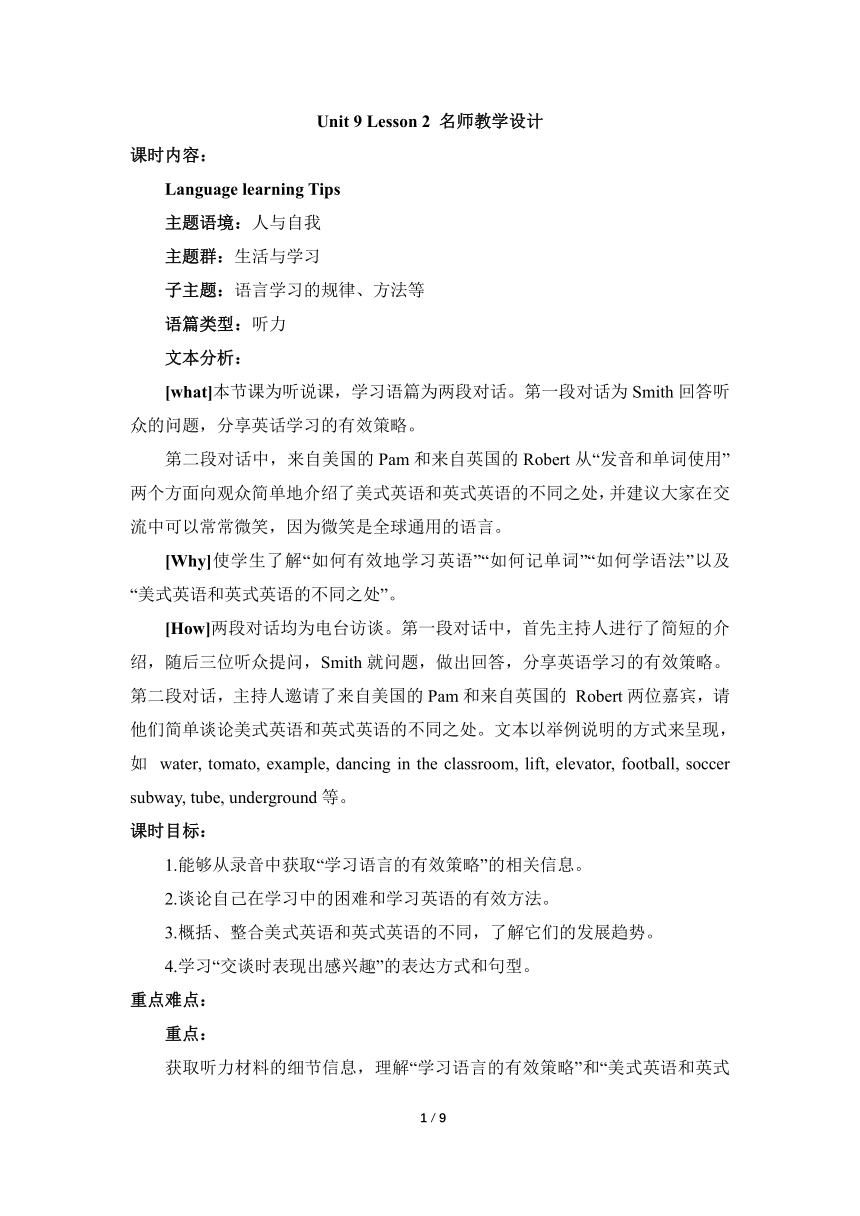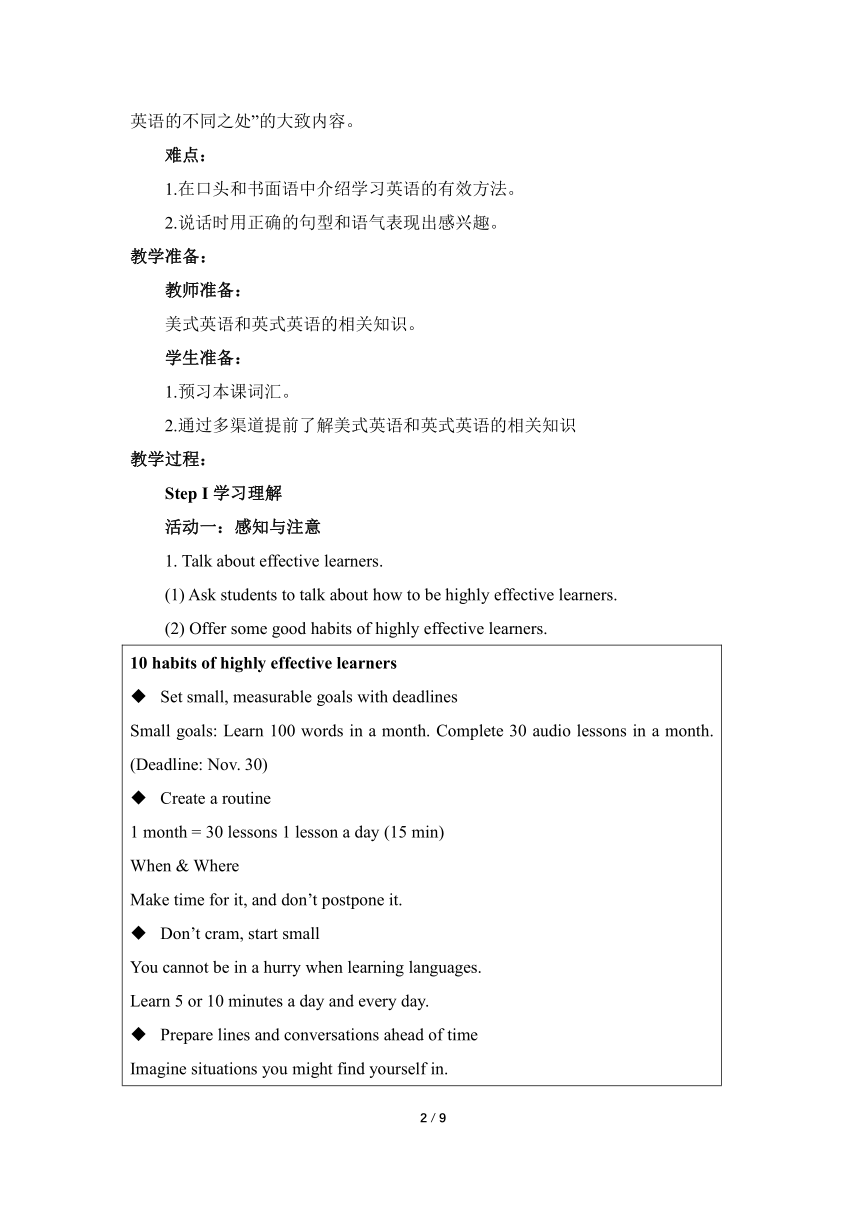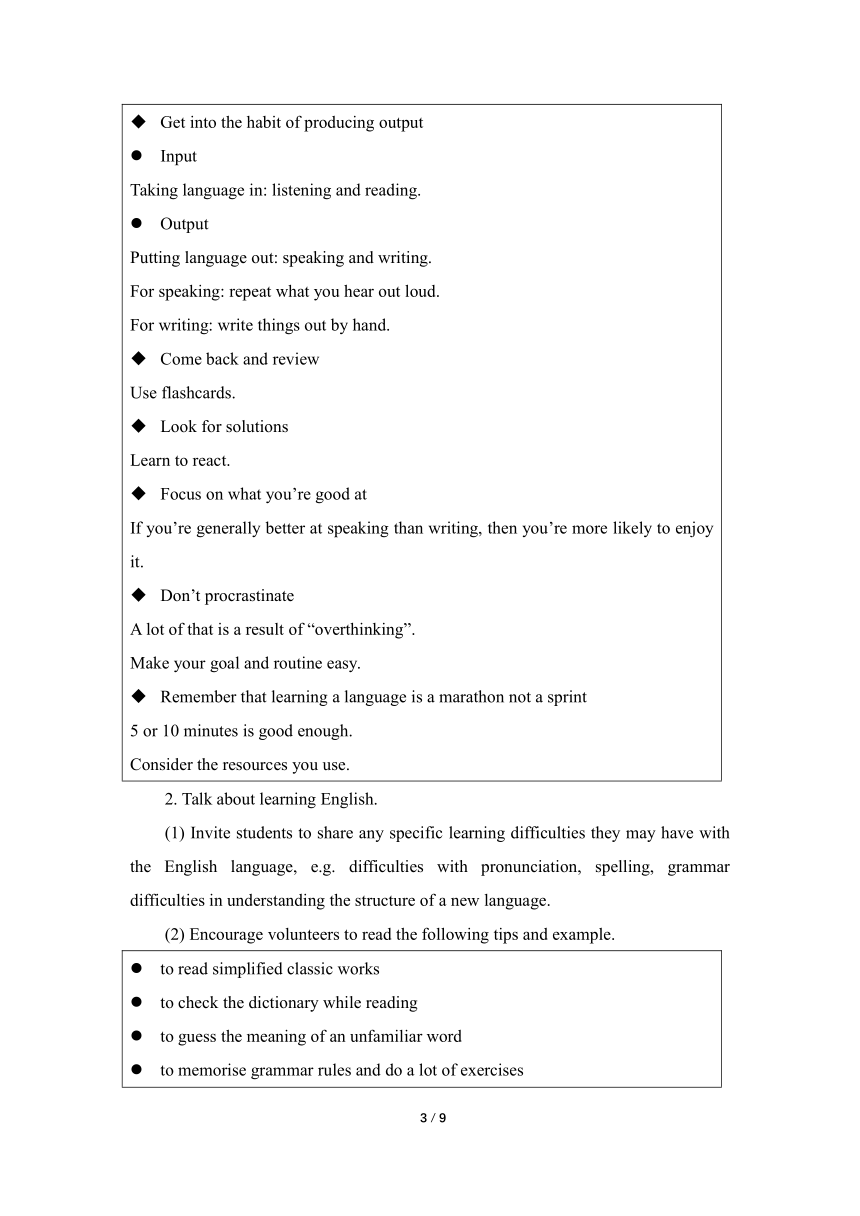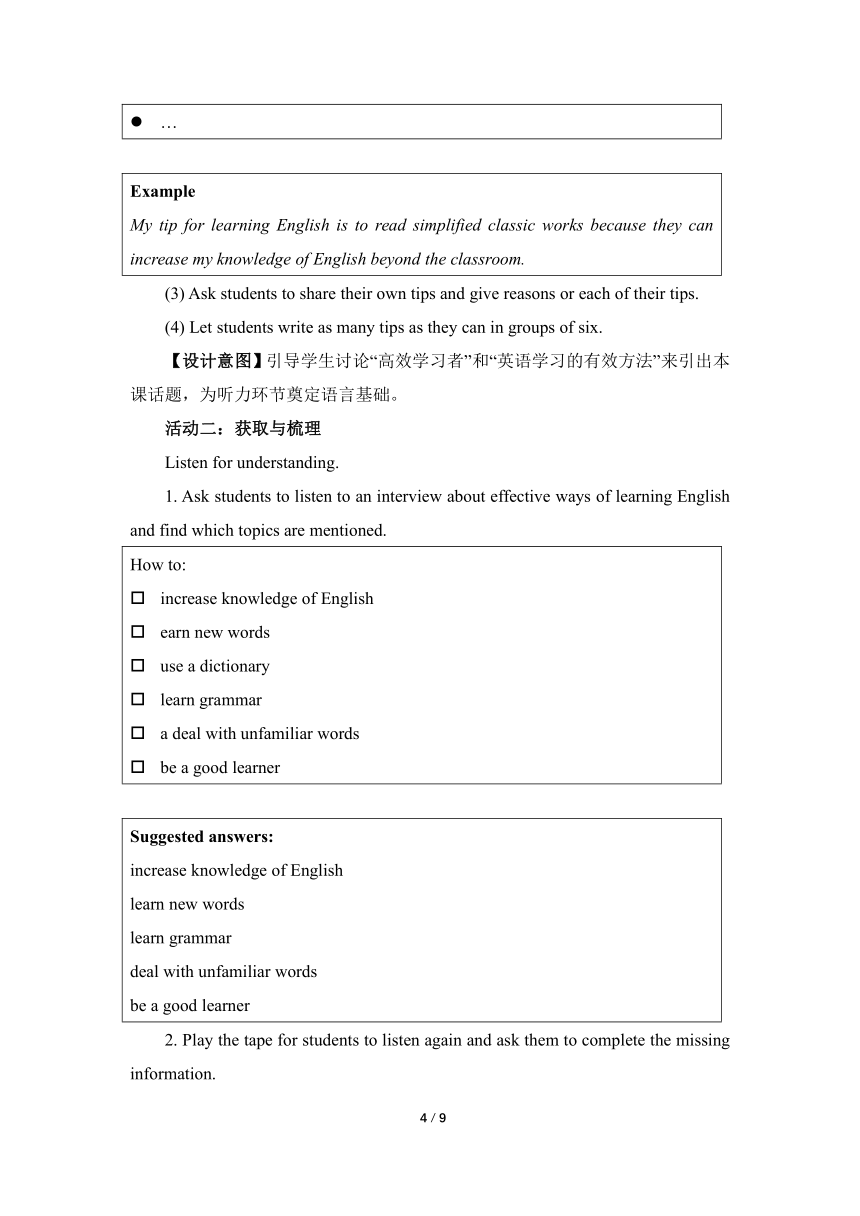北师大版(2019)高中英语必修第三册 Unit9 Learning Lesson 2 Language Learning Tips名师教学设计
文档属性
| 名称 | 北师大版(2019)高中英语必修第三册 Unit9 Learning Lesson 2 Language Learning Tips名师教学设计 |

|
|
| 格式 | docx | ||
| 文件大小 | 617.6KB | ||
| 资源类型 | 教案 | ||
| 版本资源 | 北师大版(2019) | ||
| 科目 | 英语 | ||
| 更新时间 | 2023-03-07 00:00:00 | ||
图片预览




文档简介
Unit 9 Lesson 2 名师教学设计
课时内容:
Language learning Tips
主题语境:人与自我
主题群:生活与学习
子主题:语言学习的规律、方法等
语篇类型:听力
文本分析:
[what]本节课为听说课,学习语篇为两段对话。第一段对话为Smith回答听众的问题,分享英话学习的有效策略。
第二段对话中,来自美国的Pam和来自英国的Robert从“发音和单词使用”两个方面向观众简单地介绍了美式英语和英式英语的不同之处,并建议大家在交流中可以常常微笑,因为微笑是全球通用的语言。
[Why]使学生了解“如何有效地学习英语”“如何记单词”“如何学语法”以及“美式英语和英式英语的不同之处”。
[How]两段对话均为电台访谈。第一段对话中,首先主持人进行了简短的介绍,随后三位听众提问,Smith就问题,做出回答,分享英语学习的有效策略。第二段对话,主持人邀请了来自美国的Pam和来自英国的 Robert两位嘉宾,请他们简单谈论美式英语和英式英语的不同之处。文本以举例说明的方式来呈现,如 water, tomato, example, dancing in the classroom, lift, elevator, football, soccer subway, tube, underground等。
课时目标:
1.能够从录音中获取“学习语言的有效策略”的相关信息。
2.谈论自己在学习中的困难和学习英语的有效方法。
3.概括、整合美式英语和英式英语的不同,了解它们的发展趋势。
4.学习“交谈时表现出感兴趣”的表达方式和句型。
重点难点:
重点:
获取听力材料的细节信息,理解“学习语言的有效策略”和“美式英语和英式英语的不同之处”的大致内容。
难点:
1.在口头和书面语中介绍学习英语的有效方法。
2.说话时用正确的句型和语气表现出感兴趣。
教学准备:
教师准备:
美式英语和英式英语的相关知识。
学生准备:
1.预习本课词汇。
2.通过多渠道提前了解美式英语和英式英语的相关知识
教学过程:
Step I学习理解
活动一:感知与注意
1. Talk about effective learners.
(1) Ask students to talk about how to be highly effective learners.
(2) Offer some good habits of highly effective learners.
10 habits of highly effective learners Set small, measurable goals with deadlines Small goals: Learn 100 words in a plete 30 audio lessons in a month. (Deadline: Nov. 30) Create a routine 1 month = 30 lessons 1 lesson a day (15 min) When & Where Make time for it, and don’t postpone it. Don’t cram, start small You cannot be in a hurry when learning languages. Learn 5 or 10 minutes a day and every day. Prepare lines and conversations ahead of time Imagine situations you might find yourself in. Get into the habit of producing output Input Taking language in: listening and reading. Output Putting language out: speaking and writing. For speaking: repeat what you hear out loud. For writing: write things out by e back and review Use flashcards. Look for solutions Learn to react. Focus on what you’re good at If you’re generally better at speaking than writing, then you’re more likely to enjoy it. Don’t procrastinate A lot of that is a result of “overthinking”. Make your goal and routine easy. Remember that learning a language is a marathon not a sprint 5 or 10 minutes is good enough. Consider the resources you use.
2. Talk about learning English.
(1) Invite students to share any specific learning difficulties they may have with the English language, e.g. difficulties with pronunciation, spelling, grammar difficulties in understanding the structure of a new language.
(2) Encourage volunteers to read the following tips and example.
to read simplified classic works to check the dictionary while reading to guess the meaning of an unfamiliar word to memorise grammar rules and do a lot of exercises …
Example My tip for learning English is to read simplified classic works because they can increase my knowledge of English beyond the classroom.
(3) Ask students to share their own tips and give reasons or each of their tips.
(4) Let students write as many tips as they can in groups of six.
【设计意图】引导学生讨论“高效学习者”和“英语学习的有效方法”来引出本课话题,为听力环节奠定语言基础。
活动二:获取与梳理
Listen for understanding.
1. Ask students to listen to an interview about effective ways of learning English and find which topics are mentioned.
How to: increase knowledge of English earn new words use a dictionary learn grammar a deal with unfamiliar words be a good learner
Suggested answers: increase knowledge of English learn new words learn grammar deal with unfamiliar words be a good learner
2. Play the tape for students to listen again and ask them to complete the missing information.
1 What is Dr. Smiths advice on effective English learning Dr. Smith’s advice is to ________ of English beyond the classroom. One way to do that is ________. He recommends that you try ________. The other way is to ________. 2 What is his suggestion on learning words Firstly, you should ________. A lot of the time, you’ll be able to ________ of an unfamiliar word without ________. Also, you should learn ________. For example, we say “open the book”, but “turn on the computer”. 3 What advice does he give on learning grammar Just memorising the rules is ________. His advice is that when you learn a grammar rule, you should try to use it in ________. By doing so, you’ll be learning grammar in a more natural way than from a grammar book.
Suggested answers: 1 increase your knowledge; by reading more; simplified classic literature; listen more 2 learn words in context; guess the meaning; looking it up; words in chunks 3 not helpful; speaking and writing activities.
【设计意图】通过听音频,获取英语学习的有效策略的内容,训练学生从听力文本中抓取主要内容,获取相关信息的能力。
Sept Ⅱ 应用实践
活动三:描述与阐释
1. Discuss the questions.
Do you find Dr. Smith’s advice helpful
What are other ways to learn English vocabulary and grammar effectively
2. Role-play.
(1) Role-play the interview in groups (interviewer, Dr. Smith, Caller 1, Yang An, Su Qin).
(2) Encourage volunteers to show the interview.
活动四:分析与判断
1. British and American English.
(1) Ask students to look at the pictures below and answer:
Do you know the differences between British and American English (e.g. spelling, pronunciation, vocabulary, etc.) Give some examples.
Suggested answers: Pronunciation It’s difficult to make clear distinctions between American and British accents when there is such a wide variety of accents within both the US and the UK. A Texan and a New Yorker are both Americans but have very different accents. The same goes for British accents in London, Manchester and Glasgow. However, some very general distinctions can be made. Americans usually pronounce every “r” in a word, while the British tend to only pronounce the “r” when it’s the first letter of a word. The followings are more concrete differences: Spelling Vocabulary
【设计意图】通过活动,使学生了解英式英语与美式英语在发音、拼写和词汇方面的不同,为后面的听力活动做准备。
2. Listen to the plete the notes in the table. What differences between British and American English are mentioned List the examples.
Suggested answers: Aspects: uses of words Examples: ways of pronouncing words; example, dancing in the classroom uses of words: subway, underground; tube, lift, elevator football, soccer
3. Draw a mind map to introduce the differences.
4. Listen and plete the sentences in the Talk builder.
Suggested answers: They sound so different Ah/Wow Wow/Ah Interesting
【设计意图】通过听录音,了解英式英语和美式英语的不同之处。模仿对话,学习“交谈时表现出感兴趣”的相关表达方式和句型。
Step Ⅲ 迁移创新
活动五:想象与创造
1. Make a presentation.
Act out a dialogue between an expert and a learner talking about differences between British and American English. The expert gives examples and the learner responds with interest.
(1) Ask students to make a dialogue related to the differences between British and American English.
(2) Encourage students to practise their role-play and perform it for the class.
2. Discuss.
How do you predict the development of the English language
Should I learn British English or American English
【设计意图】通过角色扮演专家和学习者之间的对话及讨论,调动学生参与角色扮演活动的积极性,内化和运用语言知识,加深对主题意义的理解。
板书设计:
Unit 9 Learning Period Ⅲ Lesson 2 I.学习理解 活动一:感知与注意 1. Talk about effective learners. 2. Talk about learning English. 活动二:获取与梳理 Listen for understanding. Ⅱ.应用实践 活动三:描述与阐释 1. Discuss the questions. 2. Role-play. 活动四:分析与判断 1. British and American English. 2. Listen to the programme. 3. Draw a mind map. 4. Listen and imitate. Ⅲ.迁移创新 活动五:想象与创造 1. Make a presentation. 2. Discuss.
2 / 2
课时内容:
Language learning Tips
主题语境:人与自我
主题群:生活与学习
子主题:语言学习的规律、方法等
语篇类型:听力
文本分析:
[what]本节课为听说课,学习语篇为两段对话。第一段对话为Smith回答听众的问题,分享英话学习的有效策略。
第二段对话中,来自美国的Pam和来自英国的Robert从“发音和单词使用”两个方面向观众简单地介绍了美式英语和英式英语的不同之处,并建议大家在交流中可以常常微笑,因为微笑是全球通用的语言。
[Why]使学生了解“如何有效地学习英语”“如何记单词”“如何学语法”以及“美式英语和英式英语的不同之处”。
[How]两段对话均为电台访谈。第一段对话中,首先主持人进行了简短的介绍,随后三位听众提问,Smith就问题,做出回答,分享英语学习的有效策略。第二段对话,主持人邀请了来自美国的Pam和来自英国的 Robert两位嘉宾,请他们简单谈论美式英语和英式英语的不同之处。文本以举例说明的方式来呈现,如 water, tomato, example, dancing in the classroom, lift, elevator, football, soccer subway, tube, underground等。
课时目标:
1.能够从录音中获取“学习语言的有效策略”的相关信息。
2.谈论自己在学习中的困难和学习英语的有效方法。
3.概括、整合美式英语和英式英语的不同,了解它们的发展趋势。
4.学习“交谈时表现出感兴趣”的表达方式和句型。
重点难点:
重点:
获取听力材料的细节信息,理解“学习语言的有效策略”和“美式英语和英式英语的不同之处”的大致内容。
难点:
1.在口头和书面语中介绍学习英语的有效方法。
2.说话时用正确的句型和语气表现出感兴趣。
教学准备:
教师准备:
美式英语和英式英语的相关知识。
学生准备:
1.预习本课词汇。
2.通过多渠道提前了解美式英语和英式英语的相关知识
教学过程:
Step I学习理解
活动一:感知与注意
1. Talk about effective learners.
(1) Ask students to talk about how to be highly effective learners.
(2) Offer some good habits of highly effective learners.
10 habits of highly effective learners Set small, measurable goals with deadlines Small goals: Learn 100 words in a plete 30 audio lessons in a month. (Deadline: Nov. 30) Create a routine 1 month = 30 lessons 1 lesson a day (15 min) When & Where Make time for it, and don’t postpone it. Don’t cram, start small You cannot be in a hurry when learning languages. Learn 5 or 10 minutes a day and every day. Prepare lines and conversations ahead of time Imagine situations you might find yourself in. Get into the habit of producing output Input Taking language in: listening and reading. Output Putting language out: speaking and writing. For speaking: repeat what you hear out loud. For writing: write things out by e back and review Use flashcards. Look for solutions Learn to react. Focus on what you’re good at If you’re generally better at speaking than writing, then you’re more likely to enjoy it. Don’t procrastinate A lot of that is a result of “overthinking”. Make your goal and routine easy. Remember that learning a language is a marathon not a sprint 5 or 10 minutes is good enough. Consider the resources you use.
2. Talk about learning English.
(1) Invite students to share any specific learning difficulties they may have with the English language, e.g. difficulties with pronunciation, spelling, grammar difficulties in understanding the structure of a new language.
(2) Encourage volunteers to read the following tips and example.
to read simplified classic works to check the dictionary while reading to guess the meaning of an unfamiliar word to memorise grammar rules and do a lot of exercises …
Example My tip for learning English is to read simplified classic works because they can increase my knowledge of English beyond the classroom.
(3) Ask students to share their own tips and give reasons or each of their tips.
(4) Let students write as many tips as they can in groups of six.
【设计意图】引导学生讨论“高效学习者”和“英语学习的有效方法”来引出本课话题,为听力环节奠定语言基础。
活动二:获取与梳理
Listen for understanding.
1. Ask students to listen to an interview about effective ways of learning English and find which topics are mentioned.
How to: increase knowledge of English earn new words use a dictionary learn grammar a deal with unfamiliar words be a good learner
Suggested answers: increase knowledge of English learn new words learn grammar deal with unfamiliar words be a good learner
2. Play the tape for students to listen again and ask them to complete the missing information.
1 What is Dr. Smiths advice on effective English learning Dr. Smith’s advice is to ________ of English beyond the classroom. One way to do that is ________. He recommends that you try ________. The other way is to ________. 2 What is his suggestion on learning words Firstly, you should ________. A lot of the time, you’ll be able to ________ of an unfamiliar word without ________. Also, you should learn ________. For example, we say “open the book”, but “turn on the computer”. 3 What advice does he give on learning grammar Just memorising the rules is ________. His advice is that when you learn a grammar rule, you should try to use it in ________. By doing so, you’ll be learning grammar in a more natural way than from a grammar book.
Suggested answers: 1 increase your knowledge; by reading more; simplified classic literature; listen more 2 learn words in context; guess the meaning; looking it up; words in chunks 3 not helpful; speaking and writing activities.
【设计意图】通过听音频,获取英语学习的有效策略的内容,训练学生从听力文本中抓取主要内容,获取相关信息的能力。
Sept Ⅱ 应用实践
活动三:描述与阐释
1. Discuss the questions.
Do you find Dr. Smith’s advice helpful
What are other ways to learn English vocabulary and grammar effectively
2. Role-play.
(1) Role-play the interview in groups (interviewer, Dr. Smith, Caller 1, Yang An, Su Qin).
(2) Encourage volunteers to show the interview.
活动四:分析与判断
1. British and American English.
(1) Ask students to look at the pictures below and answer:
Do you know the differences between British and American English (e.g. spelling, pronunciation, vocabulary, etc.) Give some examples.
Suggested answers: Pronunciation It’s difficult to make clear distinctions between American and British accents when there is such a wide variety of accents within both the US and the UK. A Texan and a New Yorker are both Americans but have very different accents. The same goes for British accents in London, Manchester and Glasgow. However, some very general distinctions can be made. Americans usually pronounce every “r” in a word, while the British tend to only pronounce the “r” when it’s the first letter of a word. The followings are more concrete differences: Spelling Vocabulary
【设计意图】通过活动,使学生了解英式英语与美式英语在发音、拼写和词汇方面的不同,为后面的听力活动做准备。
2. Listen to the plete the notes in the table. What differences between British and American English are mentioned List the examples.
Suggested answers: Aspects: uses of words Examples: ways of pronouncing words; example, dancing in the classroom uses of words: subway, underground; tube, lift, elevator football, soccer
3. Draw a mind map to introduce the differences.
4. Listen and plete the sentences in the Talk builder.
Suggested answers: They sound so different Ah/Wow Wow/Ah Interesting
【设计意图】通过听录音,了解英式英语和美式英语的不同之处。模仿对话,学习“交谈时表现出感兴趣”的相关表达方式和句型。
Step Ⅲ 迁移创新
活动五:想象与创造
1. Make a presentation.
Act out a dialogue between an expert and a learner talking about differences between British and American English. The expert gives examples and the learner responds with interest.
(1) Ask students to make a dialogue related to the differences between British and American English.
(2) Encourage students to practise their role-play and perform it for the class.
2. Discuss.
How do you predict the development of the English language
Should I learn British English or American English
【设计意图】通过角色扮演专家和学习者之间的对话及讨论,调动学生参与角色扮演活动的积极性,内化和运用语言知识,加深对主题意义的理解。
板书设计:
Unit 9 Learning Period Ⅲ Lesson 2 I.学习理解 活动一:感知与注意 1. Talk about effective learners. 2. Talk about learning English. 活动二:获取与梳理 Listen for understanding. Ⅱ.应用实践 活动三:描述与阐释 1. Discuss the questions. 2. Role-play. 活动四:分析与判断 1. British and American English. 2. Listen to the programme. 3. Draw a mind map. 4. Listen and imitate. Ⅲ.迁移创新 活动五:想象与创造 1. Make a presentation. 2. Discuss.
2 / 2
同课章节目录
- Unit 7 Art
- Lesson 1 Masterpieces
- Lesson 2 Beijing Opera
- Lesson 3 A Musical Genius
- Unit 8 Green living
- Lesson 1 Roots and Shoots
- Lesson 2 Greening the Desert
- Lesson 3 "White Bikes" on the Road
- Unit 9 Learning
- Lesson 1 Active Learning
- Lesson 2 Language Learning Tips
- Lesson 3 The Secrets of Your Memory
